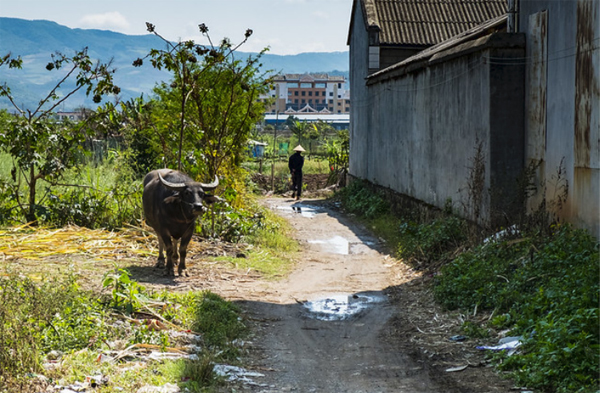For China expats, the fine line between zhende and jiade (real and fake) gets to be a running joke. We buy “Philpis” electronics—jiade (fake). We go to the market and wonder whether that very pale-looking beef is zhende (real). We read the news and learn about a new jiade Apple store, the products in which all seem to be zhende. How confusing! In a culture where fake and authentic things are sometimes hard to distinguish and where a good copy trumps copyright, many an expat has asked, “What is the real China?”

Source: Bryon Lippincott
Beyond bootleg luxury goods and cost-saving cons, there are many things in China that walk the line between zhende and jiade. From popular TV shows to entire mountain villages, some aspects of life here are practically Xeroxed from the West. When they come across something modern and sophisticated, many visitors to China, therefore, find it difficult to know if what they are experiencing is a copy or a Chinese original.
One of my friends uses the term “real China” whenever he stumbles across something cheap. As in, “I went to a real China restaurant last week. Only 100 RMB for four people!” Or, “I found a real China market. So many bargains!” If cheap equals real in China, then are all expensive things imitations? Clearly not. From caterpillar fungus to top-shelf baijiu, China has its fair share of distinctly local expensive products.
I was walking through some back streets in Guangzhou with another foreign friend of mine recently. While 30-storey housing developments were edging out the sky behind us, we stumbled across a small, friendly neighborhood of four-storey apartment blocks and unassuming corner shops. Street sweepers, no doubt, are paid by the city to focus on the main roads. As a result, this pocket of town was a little unkempt, strewn with litter, some stray dogs and a few weedy patches. My friend commented, “I don't like real China. I like the face of China better.”
This attitude seems fairly widespread among both expats and locals alike. Many think 'real China' is backwards and dirty and that developments, such as glitzy shopping malls and large, soulless apartment blocks, are an improvement. On the flip-side, while some tourists romanticize ‘real China,’ such as the fast-disappearing hutongs of Beijing, few locals actually want to live there in their current dilapidated state.
In online discussions about China or comments accompanying China-related news stories, I often notice discrepancies in the views of expat commentators which seem to be drawn largely along geographic lines. Expats who have only lived in the megacities of Guangzhou, Shenzhen, Shanghai and Beijing are seen as cut off from 'real China' in the eyes of expats who have lived in second or third-tier cities. On the other hand, expats who have spent all their time in places with (gasp) no Western chain restaurants, few large architectural projects and nary an English speaker in sight often make observations about China road safety, public hygiene and local customs that are highly offensive to city dwellers.
Foreigners, especially those who have recently arrived, tend to expect China to be either highly developed or dirt poor. While both of these expectations can be true depending on where you land, doesn’t settling on such black and white concepts defeat the purpose of traveling to a place and learning from your actual experience? Why go anywhere if you know what you'll find when you arrive?
Foreigners in China during these times have the special privilege of witnessing a nation in change. There is the pomp and dazzle of highly cosmopolitan cities like Shanghai with their skyscrapers and authentic French bistros. There are also still villages where dogs are bred for food and most people live in unheated shacks. Both Shanghai and the village are really Chinese. Which one of them is 'real China?’ I could not say.
Such contrast and confusion comes with an undeniable positive. Life in China is never boring. One of my favorite things to do on the weekend is go out and take pictures of the incongruities of modern and traditional life. I've got snaps of fishermen squatting on bamboo poles, hand knotting their old nets while talking on their iPhones; I've got donkey carts trotting past sports cars; parents encouraging their kids to pee on pavements outside ultramodern shopping centers; and robed monks riding motorcycles.
So, when we foreigners sit back in our cocoon of otherness and discuss 'real China', what do we mean? What is this definition of real? When it comes to modern China, at least, perhaps it is a concept that can't easily be defined.
So go outside, look around and soak up the entirety of real China. Be sure to take note, because it's changing fast.
Warning:The use of any news and articles published on eChinacities.com without written permission from eChinacities.com constitutes copyright infringement, and legal action can be taken.
Keywords: Real China
All comments are subject to moderation by eChinacities.com staff. Because we wish to encourage healthy and productive dialogue we ask that all comments remain polite, free of profanity or name calling, and relevant to the original post and subsequent discussion. Comments will not be deleted because of the viewpoints they express, only if the mode of expression itself is inappropriate.
Please login to add a comment. Click here to login immediately.